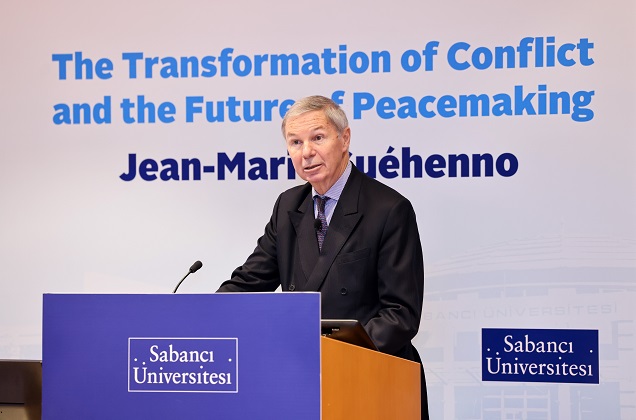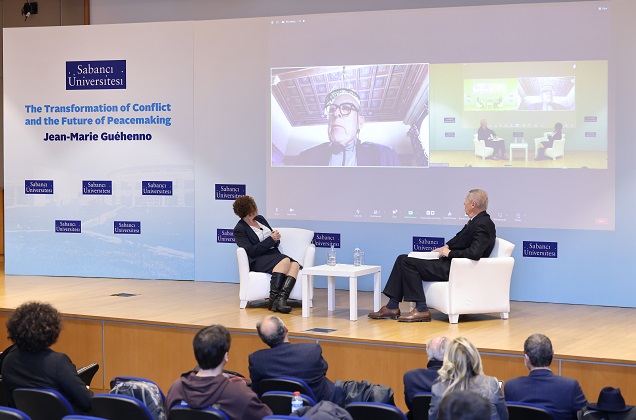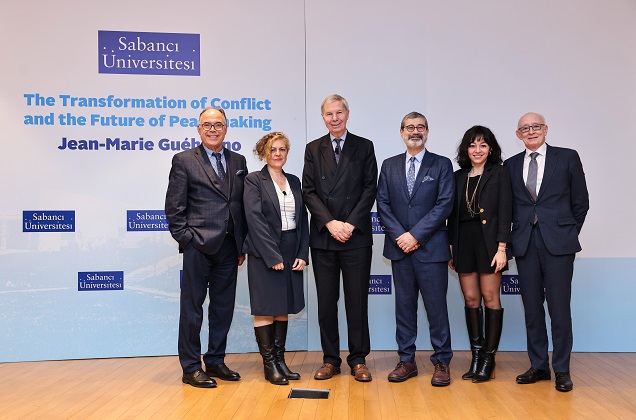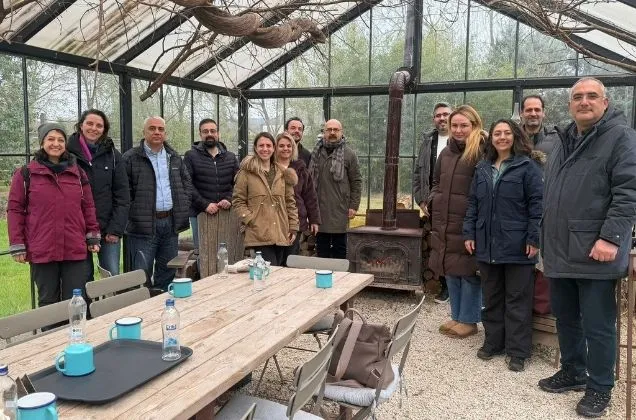19/02/2024
At a special event held on Tuzla campus, Sabancı University hosted Professor Jean-Marie Guehenno, Director of the Columbia University SIPA Kent Global Leadership Program, who managed the largest peacekeeping operation under the United Nations between 2000 and 2008, and who is also a member of the United Nations (UN) High-Level Advisory Board on Mediation.

Giving a speech titled "Transformation of Conflict and the Future of Peacemaking", Guehenno shed light on the transformation in the field of international relations in the 21st century and the impact of new technologies developing in this transformation. Prof. Guehenno said, “The number, intensity, and length of conflicts worldwide is at its highest level since before the end of the Cold War. The study found that there were 55 active conflicts in 2022, with the average one lasting about eight to 11 years, a substantial increase from the 33 active conflicts lasting an average of seven years a decade earlier. It can be clearly seen that the situation in the world has deteriorated and conflicts have increased following the improvement that occurred with the end of the Cold War."
Pointing out that the distinction between war and peace is eroding, Guehenno said “There are many actors who now have a vested interest in keeping the world off balance. In many situations, rather than talking about frozen conflicts, we should talk about rotting conflicts. That is why prevention of conflict should be the absolute priority in today’s world. However, states and international organizations cannot do it alone. For conflict prevention to be successful, business and civil society must be part of the response.”
“WE ARE IN A WORLD WITH NO AGREED STRUCTURE AND NO DEFINING PRINCIPLE”
Highlighting that the dominant cliché of our time is that we are at the beginning of a new Cold War, Guehenno described how our present is different from our past. Stating that economically the world is multipolar but it remains more integrated than it ever was since the First World War, Guehenno continued as follows: “The Cold War was in large part an ideological confrontation. Each camp was convinced of the legitimacy of its ideology. After the collapse of the Soviet Union, western nations tried hard to impose a narrative of Western universalism that had the ambition to shape perceptions around the world. It was a narrative of democratization leading to peace and prosperity. The three were supposed to go hand in hand, and were an attractive model for the rest of the world. That narrative collapses when democracies appear to be bellicose, not so democratic, while a non-democratic country, China, delivers steady economic progress. The end of the triumphalist narrative of the West has not led to its replacement by an alternative narrative. We are not in a self-confident age, but rather in a fluid and multi-layered world with no agreed structure and no defining principle.”
SOCIAL TRANSFORMATION DRIVEN BY THE DATA REVOLUTION

In his speech at Sabancı University, Jean-Marie Guehenno also emphasized that the data revolution experienced with the development of technology will reshape societies in an even more radical way than the printing press and the Industrial Revolution have. Asking the question “In the pre-industrial as well as in the industrial age, power was based on the control of physical assets. What happens when the battle shifts to virtual assets?”, Prof. Guehenno said that there are several categories of potential beneficiaries of the data revolution: individuals, scientific institutions, business, and states, and drew attention to risks that may arise due to strengthening of certain interest groups: “States and corporations can rightly claim that for the most part they will provide better security and better services to their citizens and customers. But how will individuals use their new source of power? The empowerment of individuals, like any empowerment, can lead to very different results, the best and the worst. The best, when better-informed individuals are able to make better decisions, to better manage their time, to better check the exercise of power, to better connect with others to increase a positive influence. The worst, when the connectivity of the world makes it possible for hackers to bring down entire systems, when malevolent actors are empowered, spreading false news, invading the privacy of others, blackmailing and stealing.” Guehenno added that the data revolution is an extraordinary multiplier and accelerator, which makes any attempt at anticipating the future of peace and war more difficult.
THE 'GOLDEN TRIANGLE' FORMULA IN CONFLICT RESOLUTION
Sabancı University International Board of Overseers Member Muhtar Kent, who participated in the event online, stated that the Columbia University SIPA Kent Global Leadership Program on International Conflict Resolution, which was established in his name, and of which Prof. Guehenno is the Director, acts with the "Golden Triangle" approach. He continued, " I truly believe in the 'Golden Triangle' concept, which reflects the coming together of states, business, and civil society to solve the social problems we have experienced in the last 20-30 years because we know that states, business or civil society cannot solve these problems alone.”
Muhtar Kent also shared the following information about the Kent Global Leadership Program established at Columbia University School of International and Public Affairs (SIPA): “In 2018, when I retired, I wanted to do something meaningful about the 'Golden Triangle'. When I shared this idea with the administration of Columbia University, Merit E. Janow, who was SIPA Dean at the time, said, " Let’s do something on conflict resolution and apply forcefully the golden triangle to that subject. We were very fortunate to have Professor Guehenno who has a great intellect and energy to apply the golden triangle to this subject. 'Conflict Resolution', of which Guehenno is the Director, forms the main backbone of the Kent Global Leadership Program. It brings together representatives from the state, business, and civil society every year in May, allowing them to share experiences in the field of conflict resolution."





